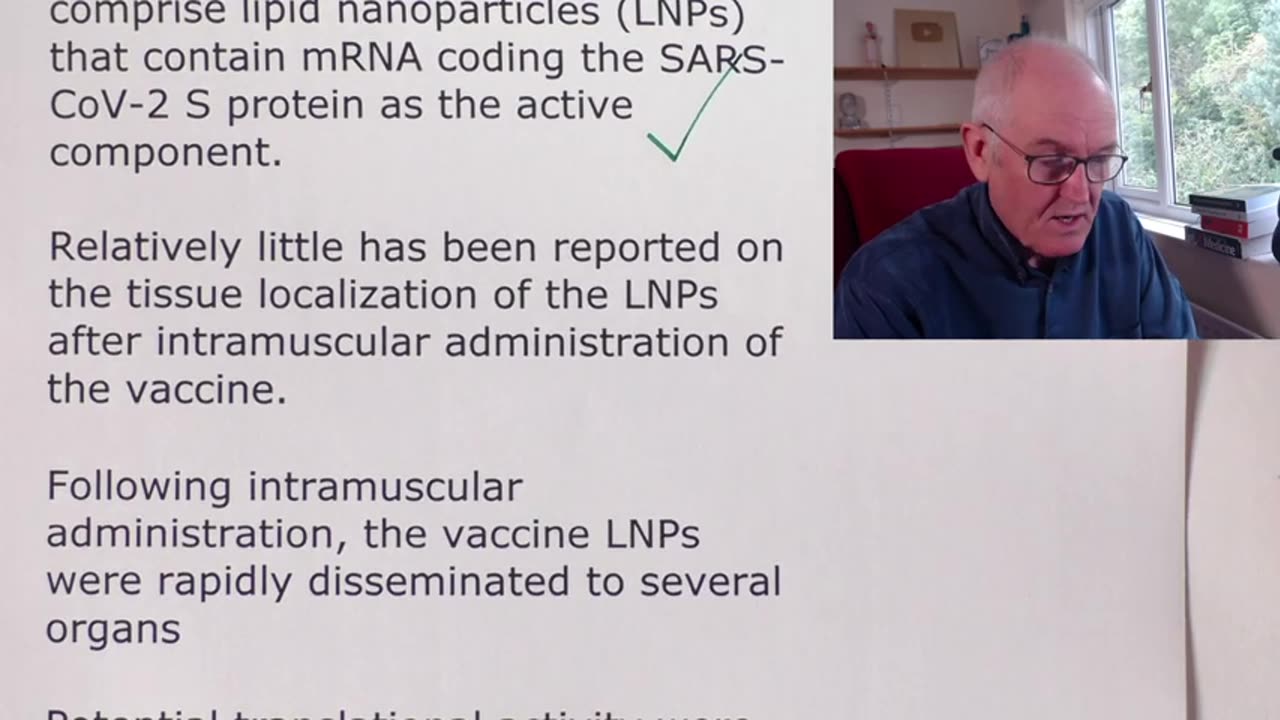Premium Only Content

Dr. John Campbell - Breast milk
Dr. John Campbell
Sept 22, 2023
Breast milk
https://www.youtube.com/watch?v=ngYWeKEvfxo
Biodistribution of mRNA COVID-19 vaccines in human breast milk
https://www.thelancet.com/journals/eb...
Background
Several vulnerable groups, such as pregnant and lactating women, have been excluded from the initial vaccine clinical trials.
The possible passage of the vaccine mRNA to breast milk (BM), resulting in neonatal exposure, was not investigated.
As a result, limited research has been conducted on the systemic distribution of vaccine mRNA during lactation,
and whether it is excreted in human breast milk (BM).
We evaluated if COVID-19 vaccine mRNA is detectable in breast milk after maternal vaccination,
and determined its potential translational activity.
Methods
We collected breast milk samples from 13 lactating, healthy, post-partum women before and after COVID-19 mRNA vaccination.
Vaccine mRNA in whole breast milk and BM extracellular vesicles (EVs) assayed using quantitative Droplet Digital PCR,
and its integrity and translational activity were evaluated.
Findings
Of 13 lactating women receiving the vaccine (20 exposures),
trace mRNA amounts were detected in 10 exposures,
up to 45 hours post-vaccination.
The mRNA was concentrated in the breast milk extracellular vesicles (EVs);
This can be significant as the breast milk extracellular vesicles act as natural LNPs, protecting the mRNA from degradation.
Milk-derived EVs are resistant to proteolysis by gastric and pancreatic secretions and can be readily absorbed by intestinal epithelial cells
However, these EVs neither expressed SARS-COV-2 spike protein,
nor induced its expression in the HT-29 cell line.
However, positive control samples used in concentrations similar to those of BM EVs also failed to induce S protein expression.
Vaccine mRNA integrity was reduced to 12–25% in BM.
Interpretation
Our findings demonstrate that the COVID-19 vaccine mRNA is not confined to the injection site,
but spreads systemically and is packaged into BM EVs.
We believe breastfeeding post-vaccination is safe, especially 48 h after vaccination.
Further investigation is required to determine the minimum amount of mRNA needed to elicit an immune response in newborns
Nevertheless, since the minimum mRNA vaccine dose to elicit an immune reaction in infants less than 6 months is unknown,
a dialogue between a breastfeeding mother and her healthcare provider should address the benefit/risk considerations of breastfeeding in the first two days after maternal vaccination.
Funding
Department of Pediatrics, NYU-Grossman Long Island School of Medicine.
More detail
The mRNA COVID-19 vaccines comprise lipid nanoparticles (LNPs) that contain mRNA coding the SARS-CoV-2 S protein as the active component.
Relatively little has been reported on the tissue localization of the LNPs after intramuscular administration of the vaccine.
Following intramuscular administration, the vaccine LNPs were rapidly disseminated to several organs
Potential translational activity were not evaluated.
-
 2:02
2:02
Rolling With You
2 days agoThis is a test. I put up a video yesterday about RFK child trafficking and chem trails and
1.71K3 -
 LIVE
LIVE
Welcome to the Rebellion Podcast
17 hours agoJedi Trump is Here - WTTR Podcast Live 5/5
5,278 watching -
 LIVE
LIVE
JULIE GREEN MINISTRIES
2 hours agoLIVE WITH JULIE
26,488 watching -
 1:10:24
1:10:24
Game On!
13 hours ago $1.03 earnedMy Fellow Sports Degenerates, What a Weekend We Had!
7.46K1 -
 17:14
17:14
DeVory Darkins
14 hours ago $56.99 earnedStephen A. Smith drops BOMB on Dems as Rosie LOSES IT over Trump
39.1K90 -
 LIVE
LIVE
The Bubba Army
3 hours agoInside Portnoy’s Antisemitic Scandal - Bubba the Love Sponge® Show | 5/05/25
6,007 watching -
 LIVE
LIVE
BEK TV
2 days agoTrent Loos in the Morning 5/5/2025
892 watching -
 24:12
24:12
marcushouse
13 hours ago $4.22 earnedStarship Just Did This... And Then It Got Weird!
23.7K20 -
 23:32
23:32
JasminLaine
18 hours agoMark Carney SILENCED by Trump—What He Said Left Everyone in Absolute SHOCK
25.9K39 -
 14:56
14:56
Degenerate Jay
14 hours ago $1.75 earnedThe GTA 6 Delay Could Have Major Consequences For Gaming
23.5K4